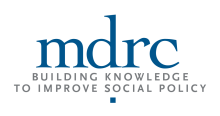Technical Assistance Approach
With guidance from an expert team, the Economic Mobility Lab’s approach to technical assistance will foster an environment of discovery and learning for nonprofit workforce training providers to improve service delivery practices. In the Lab, providers will examine the current state of their training services, identify areas for improvement, experiment with new solutions, scale operations, and increase internal capacity — allowing programs to serve more participants equitably. Participating providers will apply evidence from the field while learning how to diagnose an area of need in their service delivery model, and will design and test new approaches to address pain points with support from the EML team. For example, during the discovery phase, providers, along with the MDRC team, may identify enrollment challenges as an area of focus and co-design a solution to diversify and systematize program recruitment and intake.
Technical Assistance Phases
The EML project will include four phases where sites will engage with the MDRC team and receive tailored technical assistance. Each provider will identify a dedicated point person to be paired with a MDRC lead staff member, supported by research assistants and input from senior advisors with content expertise. The provider point person can bring in additional relevant staff to join bi-weekly meetings. Providers will also identify program participants who can attend relevant meetings, adding input and reactions to problem definitions and proposed solutions or changes. These individuals will be compensated for participating and sharing their lived experience.
Phase 1: Discovery
- Understand program’s operating context and local labor market.
- Begin identifying stakeholders and building relationships.
- Use existing data to identify an operational challenge and articulate the rationale for selecting an area of focus.
Conduct in-depth analysis of the challenge area, informed by input from program participants and staff.
Phase 2: Design
- Draft a vision for the future state, outlining what the program hopes to achieve.
- Develop a prototype solution to address issue topic or project challenge.
Identify performance metrics which will be used in the assessment phase to monitor progress.
Phase 3: Implementation/Assessment
- Launch pilot to test the prototype.
- Engage in iterative learning cycles following a Learn, Do, Reflect sequence.
Determine whether the solution improves the challenge area.
Phase 4: Sustainability
- Reflect on EML experience and lessons learned.
- Document and share operational lessons.
Create a plan for sustainability.
